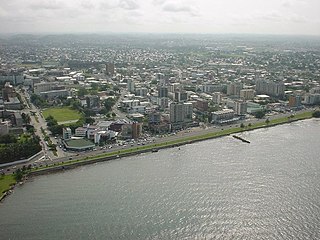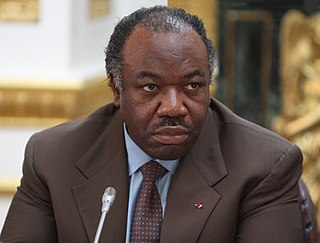Overview
Prior to the election, a victory for the ruling Gabonese Democratic Party (PDG) was expected. [2] There were a total of about 850 lists presented in the elections, and campaigning ended at midnight on April 26. [3] Results given by the Interior Minister, André Mba Obame, on May 3 [4] showed the PDG winning 1,154 seats, while the opposition Gabonese Union for Democracy and Development (UGDD) won 161 seats. [2] The Union of the Gabonese People (UPG) won about 90 seats, while many seats were won by independents. [5]

The Gabonese Democratic Party, is the ruling and dominant political party of Gabon. Between 1968 and 1990 it was the sole legal party.
André Mba Obame was a Gabonese politician. After serving as an adviser to President Omar Bongo in the 1980s, he was a minister in the government of Gabon from 1990 to 1991 and again from 1997 to 2009; during that time, he was identified with the reformist wing of the ruling Gabonese Democratic Party (PDG). He held the key post of Minister of the Interior from 2006 to 2009 and then briefly served as Minister of the Coordination and Follow-up of Government Action in mid-2009. He was an independent candidate in the 30 August 2009 presidential election and placed third with 25.33% of the vote, according to official results, but he claimed victory and alleged that the PDG candidate, Ali Bongo, won through fraud.

The Gabonese Union for Democracy and Development was a political party in Gabon.
According to Mba Obame, the PDG majority confirmed the voters' "commitment to the implementation of the political project" of President Omar Bongo. The results still had to be validated and proclaimed by the Constitutional Court. The councillors were to elect mayors within eight days of the formal proclamation of results. [2]

El Hadj Omar Bongo Ondimba was a Gabonese dictator under French control who was President of Gabon for 42 years, from 1967 until his death in 2009. Omar Bongo was promoted to key positions as a young official under Gabon's first President Léon M'ba in the 1960s, before being elected Vice-President in his own right in 1966. In 1967, he succeeded M'ba to become the second Gabon President, upon the latter's death.
Obame placed voter turnout at between 65% and 70%. [2] Although reported high in most of the country, it was said to be low in Libreville, the capital, where it was estimated at about 17%. [5]

Libreville is the capital and largest city of Gabon, in western central Africa. The city is a port on the Komo River, near the Gulf of Guinea, and a trade center for a timber region. As of 2013, its census population was 703,904. The area was originally inhabited by the Mpongwé tribe before the French acquired the land in 1839. In 1846, a Brazilian slave ship was captured by the French navy assisting the British Blockade of Africa, and fifty-two of the freed slaves were resettled on the site. It became the chief port of French Equatorial Africa from 1934 to 1946, and was the central focus of the Battle of Gabon in 1940. Libreville was named in imitation of Freetown, and grew slowly as a trading post and a minor administrative centre, reaching a population of 32,000 on independence in 1960. Since independence, the city has grown rapidly and now houses nearly half the national population. It is home to a shipbuilding industry, brewing industry, and sawmills, and exports raw materials such as wood, rubber and cocoa.
There were 119 constituencies in the election, and the PDG was the only party to present candidate lists in all of them. In Libreville, the PDG won a plurality of seats but failed to win a majority, taking 42 of the 98 seats and winning in three of the six arrondissements. The PDG's best result in Libreville was obtained in the fifth arrondissement, where its list was headed by former Prime Minister Jean-Francois Ntoutoume Emane and it obtained 12 out of 16 seats. In the country's second city, Port-Gentil, the PDG won only 15 out the 63 seats, while the independent list of Mayor Séraphin Ndaot Rembogo won 28. [2]

Port-Gentil or Mandji is the second-largest city of Gabon, and its leading seaport. It is the center of Gabon's petroleum and timber industries. Although it lies inshore, the nearby mainland is a remote forest area and it is not connected by road to the rest of the nation. The city lies close to Cape Lopez, the westernmost point in Gabon. It had a 2013 census population of 136,462.
Following Obame's announcement of results, the Rally for Gabon (RPG), which is part of the presidential majority, held a protest against the results, alleging that various means were used to skew the vote in favor of the PDG. It demanded that the vote in Libreville be cancelled and that the electoral system be reformed. [6]
The President of the Constitutional Court, Marie Madeleine Mborantsuo, announced final results on May 7, confirming the PDG's victory, with its numbers largely unchanged from those given by Mba Obame a few days earlier. Emile Moussavou Moundziegou, a PDG deputy who was accused of destroying a ballot box, was penalized by being barred from office for five years. Additionally, the Court ordered an investigation of violence that occurred in Lemboumbi-Leyou Department in the south-east and in the commune of Mitzic in the north, noting that any elected candidates who were involved in this violence would also lose their mandates. [4] [7]
On May 8, the government set the election for mayors of municipalities and for the presidents and vice-presidents of departmental councils for May 20; the election for mayors of arrondissements was to be held on May 25. [1]
The election for mayors of municipalities and for the presidents of departmental councils was held on May 23, and Ntoutoume Emane was elected unopposed as Mayor of Libreville. He received 84 votes; the remaining 14 votes were invalid. [8] Four deputy mayors were also elected: Michel Teale of the PDG, Christian Odou Mba of the Rally of the Gabonese People (RPG), Eloi Ndzondo of the Circle of Liberal Reformers (CLR), and Léandre Zué of the PDG. [9]









